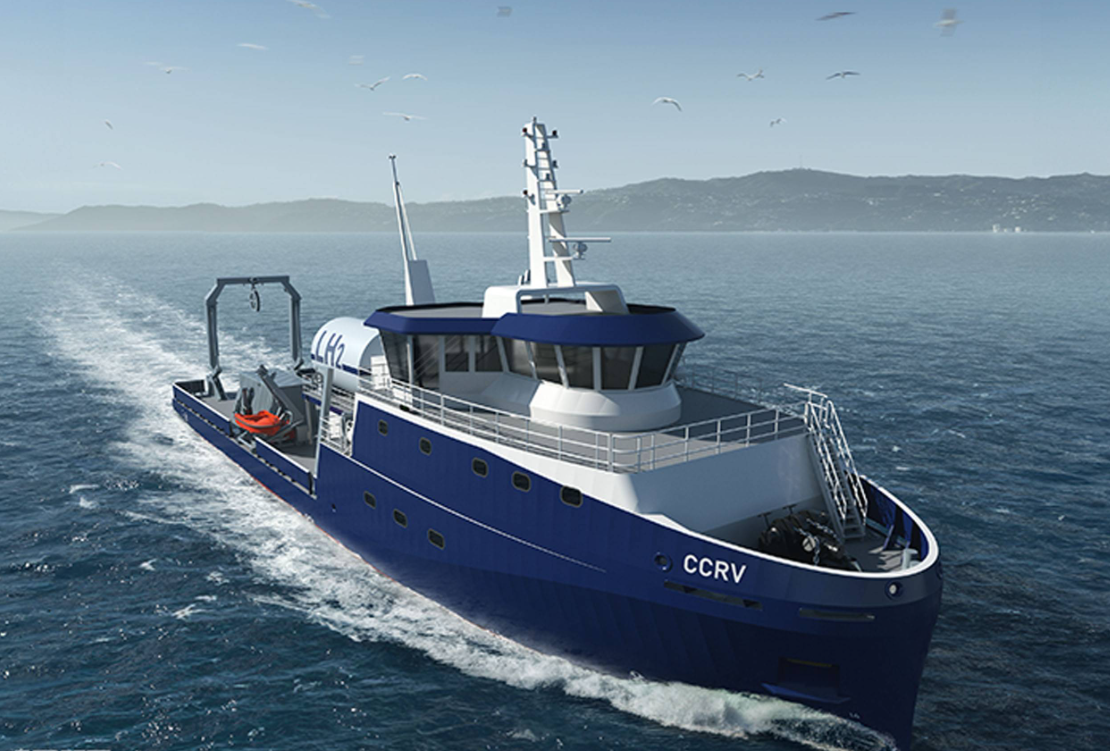Glosten was awarded an Approval in Principle (AIP) by the American Bureau of Shipping (ABS) for the design of UC San Diego’s new hydrogen-hybrid Coastal-Class Research Vessel (CCRV). The CCRV will be operated by Scripps Institution of Oceanography and feature a propulsion system that uses hydrogen fuel cells for zero-emissions operation.

Glosten and the project’s electrical integrator, Siemens Energy (SE), completed the preliminary design for the CCRV in March 2024. As an uninspected, California Air Resource Board (CARB)-compliant, ABS-classed vessel and an alternative design under SOLAS, the CCRV faced a
complex regulatory regime.
“Our challenge was to harmonize the requirements of a modern research vessel with evolving regulations and novel technologies for liquid hydrogen fuel. Ensuring the machinery spaces and hydrogen systems were efficiently and safely arranged without compromising the utility of the
vessel was like putting together an intricate puzzle,” said Robin Madsen, the lead marine engineer on the project for Glosten.
In 2018, Glosten, Scripps Oceanography, Sandia National Laboratories, and DNV conducted a feasibility study that became the genesis of the CCRV. The study evaluated the technical, regulatory, and economic feasibility of the Zero-V concept, a vessel powered by fuel cells and
liquid hydrogen designed to meet performance and environmental criteria established by Scripps. While the study confirmed that technology had advanced enough to make a hydrogen-powered research vessel possible, regulations around the use of hydrogen fuel are still in development.
Prior to submitting the design for AIP, Glosten successfully completed a week-long risk assessment workshop with the USCG, Scripps, SE, and major equipment providers, Ballard Power Systems and Chart Industries.
AIP shows that the CCRV design meets the technical requirements and safety standards of ABS, but more broadly, it validates the use of hydrogen-fuel-cell propulsion for medium-sized coastal vessels. The CCRV will help Scripps and its researchers study the marine ecosystem
along the California coast, running entirely on emissions-free hydrogen fuel cells for 75 percent of its missions.
“Our goal is to produce a fully capable ocean-going research vessel that meets the needs of our scientists and students, and demonstrate that this can be done in a way that absolutely minimizes its impact on our environment,” said Bruce Appelgate, associate director of Scripps
and head of ship operations and marine technical support. “This will be a world-class oceanographic research vessel that aligns with our institutional values for protecting the planet.”
The project team is currently progressing the CCRV to a functional-level design and assisting Scripps with a request for proposal to begin solicitation for construction.


